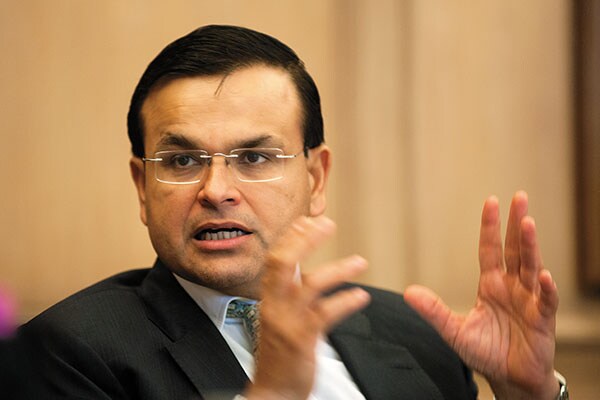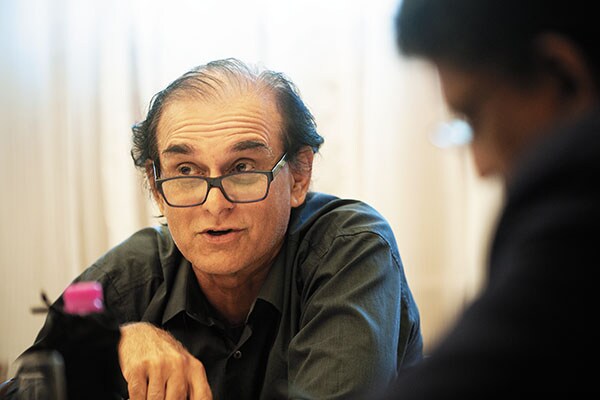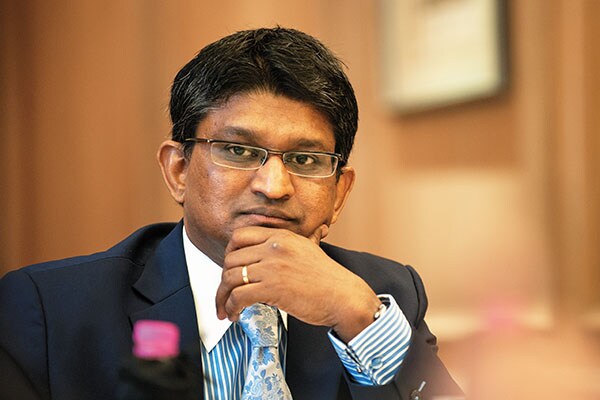India Inc's top CEOs track the route to double-digit growth
Some of India's top business leaders engage in the first-ever Forbes India CEO Dialogues to discuss India's road to economic recovery


India is at the cusp of a possible economic recovery. With a landmark political mandate, the Bharatiya Janata Party (BJP) is well-placed to facilitate this transformation. Its goal: Double-digit growth, say industry bigwigs. But can India withstand external pressures such as rising fuel prices, led by the strife in Iraq, and a weak monsoon?
The inaugural Forbes India CEO Dialogues: The Leadership Agenda invited some of India’s top business leaders to a closed-door conversation to chart out the ‘Road to 9 Percent’.
Ajit Gulabchand, chairman of Hindustan Construction Company (HCC), Harsh Mariwala, chairman of Marico, Dilip Piramal, chairman of VIP Industries, Sunil Kaushal, regional chief executive, India & South Asia of Standard Chartered, and Ashish Chauhan, MD & CEO of Bombay Stock Exchange identified the long-term reforms which the Narendra Modi-led BJP government must undertake to help kickstart economic growth.
The discussion was moderated by Senthil Chengalvarayan, editor-in-chief, Network18 Business Newsroom. Excerpts:
Senthil Chengalvarayan: The road to 9 percent is a key issue. What is the mood like, how different is it from two months ago? Are investors confident to put their money where their mouths are?
Harsh Mariwala: The mood is very bullish people expect a lot of changes because the mandate is clear. The concerns have all gone: The conflict at the top between the former prime minister and the rest of the party weak UPA numbers, a weak prime minister who was not willing to act, which led to power plays with different ministers, [the lack of] inter-department co-ordination, which created a vacuum in the former government—all this is gone.
We now have a person who everyone relates to. Within the party, it is clear that he [Modi] is calling the shots. After a long time, India has a strong leader who is not dependent on alliance partners. All the underlying factors which were responsible for creating the overall paralysis have been resolved. This is making people bullish.
But we also have some things to worry about. Has he promised too much? Are the expectations too high? People will wait for one or two years. If there are strong expectations and a big setback, it could lead to some degree of upheaval in society, which can impact everyone.
Inflation is a worrisome issue. Fundamentally in the economy, there are supply problems, mostly on agricultural items, barring foodgrains. Because of factors like the lack of roads, lack of refrigeration processes and a limited shelf life [of grains], money is not being pumped into these agricultural processes. Modi has to be cautious and [has to] manage growth in such a way that it does not lead to high inflation or high environmental degradation.
Ajit Gulabchand: I agree. There were many obstacles for governance in the previous set-up. But there are some issues that confront this government too. There are legacy issues in which the whole economy has substantially collapsed. Repairing it is an essential task which will become the foundation of things to happen.
Prior to the elections, there was a sense of hopelessness that this will happen. It has now entered the realm of possibility. We have a serious infrastructure issue where the government is yet to pay Rs 1,50,000 crore to the sector. There is a logjam at the banks. There is dedicated work to be done to resolve these things. There are also several projects held up by the environmental ministry. An arduous task is to create objective and measurable standards which are easy for everyone to see and follow—and this will require some time.
A grandfather legislation is required to free the Rs 50 lakh crore worth of projects that are being held up. The direct taxes draft is draconian and needs to be addressed. The thing to be learnt from the Companies Bill is that the government should not scrap an existing bill. It should take the old one and amend it. The goods and services tax (GST) is good but it means that India has to become a common market, which all states must agree to and see a benefit from.
There are many serious administrative problems which require dedicated thinking in the next 1-2 years. Subsidies are a big concern and need to be balanced India’s revenues have not grown to the extent that expenditures have. These factors come in the way of investments and the ease of doing business, without which the 15 million jobs we need to produce, cannot be done.
Chengalvarayan: Has the spirit come back? Will that see us through?
Dilip Piramal: This is a golden opportunity for India. We finally have a man [since independence] who understands economics, governance and is not dogmatic. Socialistic policies did not do us any good in earlier decades. If BJP gets 10 years to rule, [Modi] can really change the face of the country... like it has happened in China and Singapore.
We did not have great governments over the past 10-15 years. The bureaucracy will start to change. If we follow the right policies, there is so much potential. The consumer market is there we have resources, a talented workforce and potential for huge growth. Twelve percent growth is not difficult after 2-3 years.  Sunil Kaushal, regional chief executive, India & South Asia, Standard Chartered
Sunil Kaushal, regional chief executive, India & South Asia, Standard Chartered
Chengalvarayan: What should Modi’s first priority be?
Sunil Kaushal: Given our current infrastructure, I do not think India is ready for 9 percent growth. Our focus has to be to build infrastructure. Look at China, which has similar size, demand and progression of growth. But they have managed to control inflation—it has rarely crossed 5 percent—despite their high growth. The main reason is their supply chain and the infrastructure [they have] to support it.
India got it wrong when we went through our first phase of transformation in which we tried to expand infrastructure. Industry, bankers and policymakers got it wrong. Given the policy paralysis, there is a payment backlog in India which has to be cleared. A US-based investment bank said projects worth $336 billion were stuck, of which investments worth $86 billion were cleared by the previous government.The point is, the problems of yesterday could become the catalyst of growth for tomorrow. Infrastructure and power are the low-hanging fruit for the government.
Of the projects which are stuck, an independent study shows that 55 percent are due to acquisition of land another 15 percent due to environment and 18 percent due to resource linkages such as coal and gas. These can be tackled by the government head-on. So in terms of 9 percent growth, I feel we are 4-5 years away from it.
Chengalvarayan: So, it comes down to the financing of infrastructure?
Ashish Chauhan: China boarded the bus to expansion in 1979 and India in 1991. How is the world looking at us in the larger context? The recent elections were like a project, now we need maintenance people to run it. Luckily, the CEO [Modi] who has come in, has done maintenance work too.
In the past 2-3 years, we have not created many jobs in rural areas this has manifested itself in different ways. For India, the job for the next 10-20 years is to create jobs there is no other job we have. Inflation must be addressed. Unemployment with high inflation is what I call Egypt. We need to bring skilled labour into infrastructure and manufacturing projects.
Piramal: We need to encourage states to compete and do better than each other. I want to give a perspective on the taxation structure. For the first time, service tax will be the highest component of indirect taxes, at around Rs 15,000 crore.
Chauhan: If India has to grow at the pace at which it wants to grow, it must spend $1 trillion on infrastructure and another $500 billion on manufacturing over the next seven years. Half of this can be raised by our banks, which is possible.
Chengalvarayan: Where will the money come from? Private-public participation has not worked. What are the creative ways to raise money, then?
Kaushal: As far as capital and funding is concerned, Eastern countries will be key players for India’s infrastructure development. Capital will go to places where they see good returns, good governance and good prospects of growth. The West and some countries in the South China region want India to succeed.
The other thing is to develop the capital markets. We need participation from the large holders of savings in India, like pension funds and life insurance companies. Restrictions on where they can invest must go. The banking sector requires huge reforms, particularly the larger banks.
Are we going to hit 100 percent of what we are aiming for [$1.5 trillion]? Maybe not immediately. But we must remember that India has spent $500 billion on infrastructure in the 11th Five-Year Plan. The next five-year plan said $1 trillion. We might have lost a few years after that, but we can lend more. The infrastructure projects which come up now will be of the highest quality. The mood of banks is also starting to change.
Chengalvarayan: To get to double-digit growth, we need to get our infrastructure in place, raise equity, create jobs and concentrate on manufacturing. How do you make all this happen?
Kaushal: Fiscal consolidation is important. It will give us elbow room for everything else. We are [allocating] only 1.2 percent of GDP on capital spend this needs to be pushed up to 5 percent. Capital spend can only increase if you reduce revenue spend on salaries, interest rates, etc.
Gulabchand: Our defence sector has been very cornered, and is an inefficient public sector. If we improve our defence, there is huge GDP growth possibility it will boost infrastructure and private sector investment. Harsh Mariwala, chairman, Marico
Harsh Mariwala, chairman, Marico
Mariwala: We have to look at growth first and then welfare funded out of growth. We must define the role of the central government and the states. We need to build trust between ministries, bureaucracy, CBI, courts, business, international investors… trust is at an all-time low. Whatever is required to build trust must be done: Handle retrospective amendments, improve relations with neighbouring countries. Business should not have a fear of punishment, raids and harassment from the government. When the US president comes, he brings his industrialists along as a part of his delegation. Here, businessmen are perceived to be pariahs.
The other thing is to boost speed, efficiency and governance. It could be removing wastage, ensuring faster clearances, removing corruption, ensuring ease of doing business—police, judicial and administrative reforms. The last is inflation control.
I have a list of gamechangers to take us to 10 percent growth. It is estimated that Rs 84 lakh crore is lying outside India. Can we have an amnesty scheme to bring back all the money? We must create fear that those who are caught later will be put in jail.
The government must address the excess food grains issue, to reduce inflation. It must look at privatisation of coal mines which will resolve some of our power issues. Labour reforms are also critical.
Genetically-modified crops need to be distributed more to increase productivity. The government also has a huge land-bank which it must start selling.
We must also improve our relations with Pakistan and Bangladesh, which will help address our defence and trade budgets.
Gulabchand: I suggest that the RBI reform itself. It must stop micro-management of banks. It has a strangulating control over banks and a conflict of interest in its own job. If the RBI focuses on managing monetary control and, in extreme cases, exchange control and inflation, things would be better. We need to reform the governance of our cities. Urban infrastructure issues are not resolved because there is nobody who decides these matters. We must decentralise cities to move to rapid growth. The Modi government spoke about creating 100 new cities, but we have to think about how to govern those cities.
Chauhan: There is one more issue we need to understand. For the last 20 years, we had reasonable growth led by information technology. This is starting to plateau. We need 4-5 new technologies and, in India, we need genetic modification for agri-crops, 3D printing, wearable computers, robotics—we have to get our next generation involved in these technologies. Also, 2017 onwards, China will have less labour entering the job market. So, India’s growth will be 2 percent higher than China’s, no matter what, with a focus on manufacturing.  Senthil Chengalvarayan, editor-in-chief, Network18 Business Newsroom
Senthil Chengalvarayan, editor-in-chief, Network18 Business Newsroom
Chengalvarayan: What do you all want to see from the budget?
Mariwala: I don’t think we can expect much from it.
Kaushal: He [Modi] must show a sense of direction. He must take tough decisions on the revenue front, in terms of subsidies. In the first two years, substitute the gap between revenues and expenditure through divestment and asset sales. And ultimately, higher GDP growth will help the government collect more taxes.
Gulabchand: He must give a signal that we are opening up the economy and are serious about reforms. It will improve the investment climate and the ease of doing business. Besides, he must do housekeeping of the mess that exists, without which all these possibilities could remain dreams.
Chauhan: All these issues hinge on proper law and order. If law and order is not there, nothing will fall into place. Also on legislation, we should not do it on a rear-view mirror basis. Create your laws based on what is coming in the future.
First Published: Jul 14, 2014, 06:44
Subscribe Now